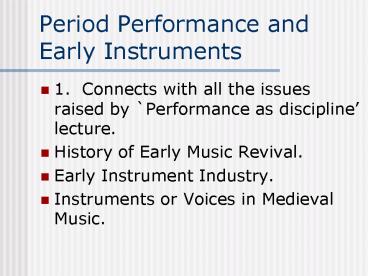Period Performance and Early Instruments - PowerPoint PPT Presentation
1 / 10
Title:
Period Performance and Early Instruments
Description:
Music Revival goes back to Mendelssohn's 1829 revival of ... The Idea that before the 19th Century People were only interested ... in the Edwardian Era ... – PowerPoint PPT presentation
Number of Views:81
Avg rating:3.0/5.0
Title: Period Performance and Early Instruments
1
Period Performance and Early Instruments
- 1. Connects with all the issues raised by
Performance as discipline lecture. - History of Early Music Revival.
- Early Instrument Industry.
- Instruments or Voices in Medieval Music.
2
Early Music Revival
- Music Revival goes back to Mendelssohns 1829
revival of Bachs St Matthew Passion and of his
revivals of oratorios by Handel and Hadyn. - The Idea that before the 19th Century People were
only interested in music that was contemporary is
not really true. The Academy of Ancient Music
related to the Academy of the 18th London that
aimed to maintain Corelli and Handel. - Handels Messiah has been performed ever since it
was written. Eighteenth Century Musicologists
like Hawkins knew a lot about Renaissance Music
and Medieval Music and were able to enlighten
others. - Bach and Handel Societies in both England and
Germany flourished in many provincial towns and
cities and fuelled the choral traditions in
those countries.
3
Brussels Instrument Museum
- The Development of Instrument Museums and the
playing of old instruments (Brussels and the
Fetiss Historical Concerts in the 1880s and
90s). - Brussels concerts on original instruments heard
by Arnold Dolmetsch (1858-1940) family tradition
of instrument tuning, mending and playing
especially of Bachs 48.
4
Dolmetschs Legacy
- The apostle of retrogression instrument maker,
performer, polemicist, scholar and teacher.
Played all the instruments and believed in going
back to primary sources. - Early Music and the Arts and Crafts Movement.
The personal connection with William Morris and
his emphasis on craftsmanship, do-it-yourself and
the grow your own earthiness traditions. - Haslemere, The Dolmetsch Family, the festival,
recordings and BBC connections. - Recorder movement in schools.
5
Elizabethan Fever in the Edwardian Era
- Edmund Fellowes and madrigals/lute songs
(co-inciding with revival of English composition
Elgar and VW). - Revival of Tudor Church Music of the Oxford
Movement and Surpliced choirs in all parish
churches). - Co-incided with period when Britain was
convinced of its superiority and empire at its
height.
6
Interwar Years and the Spread of Ideas
- Interwar Years The Schola Cantorum
Basiliensis, Schola Cantorum of Paris Schools
starting up dedicated to reviving Early Music
close connection with academics. Schools in
Germany in 1920s dedicated to particular
instruments, e.g. Lute . - Modern composers rediscover Early Music
(Stravinsky, Hindemith, Busoni and Others) - American Renaissance (Dolmetsch and Landowska in
America). Hindemith at Yale. New York Pro
Musica. - Thurstan Dart and the scholar musician.
7
1960s and Post War Generation - Flambouyant
Performers
- !960s and gathering pace of Baroque Opera
Revival. Baroque dance and stagecragt
resurrected. - Alfred Deller and the Countertenor renaissance.
- Early music Subcultures Noah Greenberg, David
Munrow, Gustav Leohardt. - Amateur factor. Industry started with followers
and groupies - Early Music in Japan, Eastern Europe,
Scandinavia.
8
1980s and Beyond
- Beethoven, Brahms and Beyond Classical and
Romantic Music on Period Instruments. Influence
on Concert Programming, Musical Education and
Recording Industry. - Historical Performance The Dominant Musical
Ideology of Our Time. Affecting the way modern
classical performers play e.g. the erosion of
acceptance of vibrato - But also questioning of the preoccupation with
the past.
9
Post 1980s ideas - Instruments or Voices
- Idea that the use of instruments in medieval
music is always questionable very little of the
notation is intended for instruments and before
the 15th centuries instrumentalists would not
have been musically illiterate. English a
capella heresy - Questioning of the need for authenticity as it
is unobtainable anyway - and banning of the word.
10
Harry Haskels book on the Early Music Revival
- Authenticity is of course the nub, the central
issue, the very raison detre of the early music
movement. In a sense, the history of the
movement is the history of the search for
authenticity or more accurately, the history of
changing concepts of authenticity in the
performance of early music. A distinction must
now de drawn between the early music revival, as
that umbrella phrase has been rather loosely used
so far in this book, and what has come to be
called the historical performance movement.
Clearly many of the musicians associated with the
revival of early music and instruments have had
little or no interest in historical modes of
performance. Only recently has the attitude
expressed in Landowskas famous remark you play
Bach your was, Ill play Bach his way gained
general acceptance among early musicians.
Haskell, p.175






























